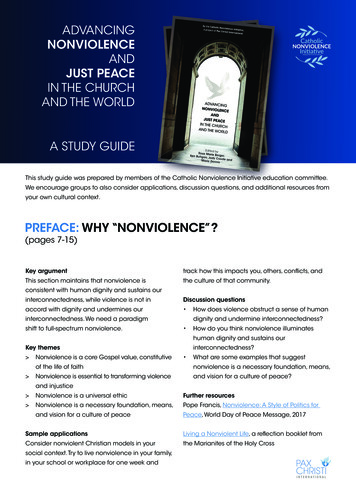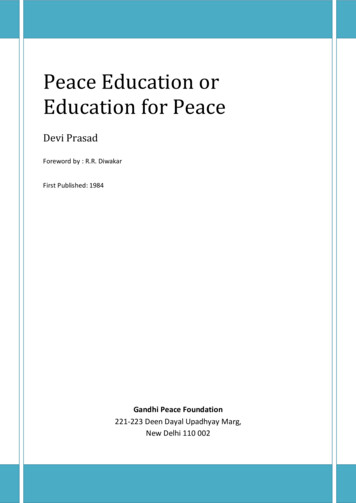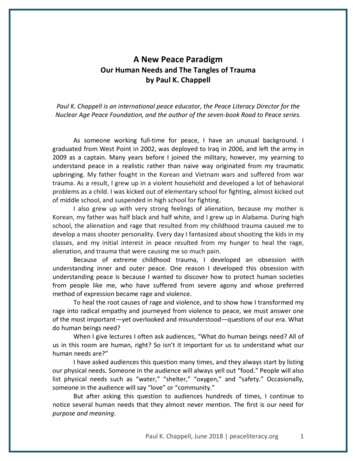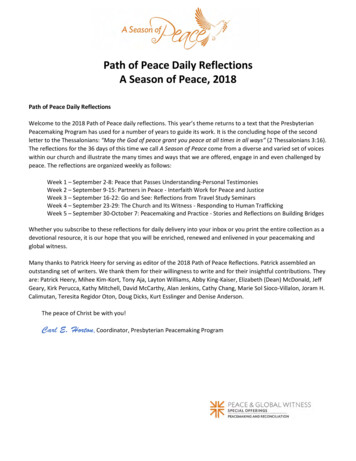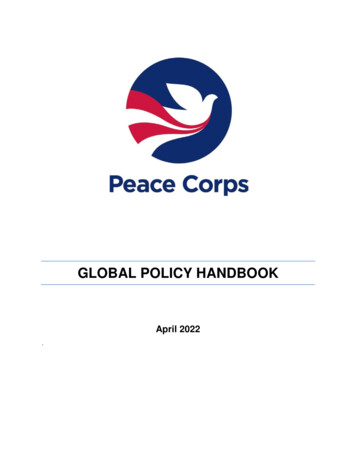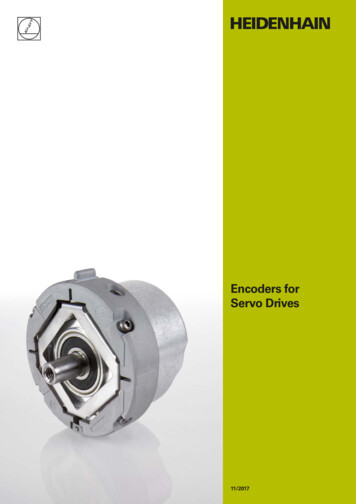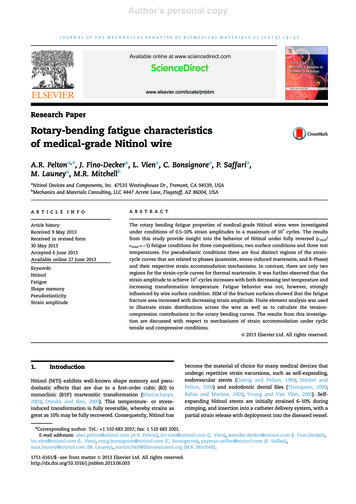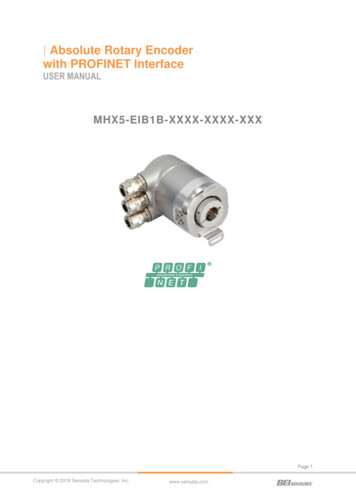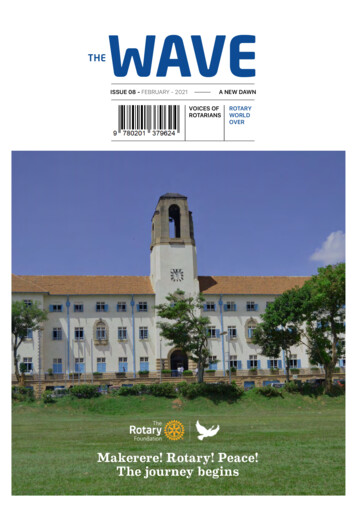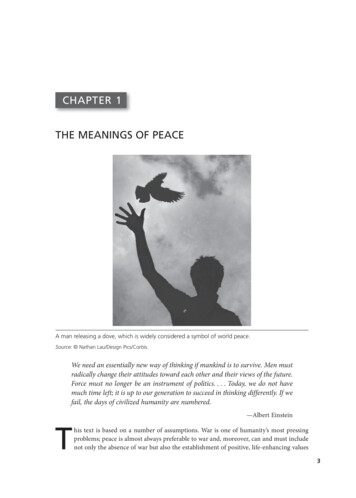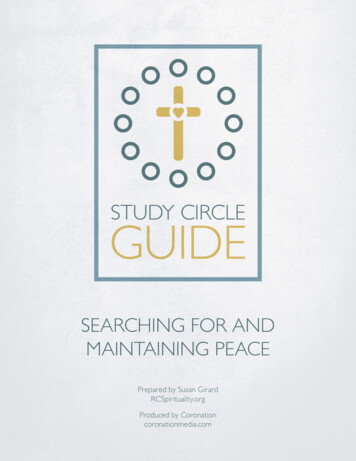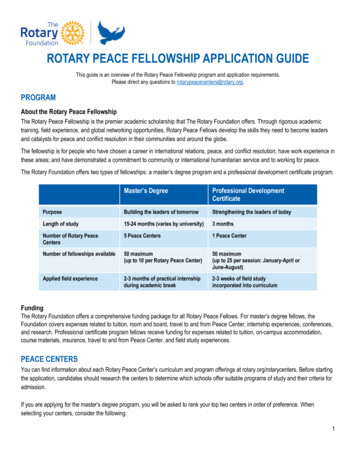
Transcription
ROTARY PEACE FELLOWSHIP APPLICATION GUIDEThis guide is an overview of the Rotary Peace Fellowship program and application requirements.Please direct any questions to rotarypeacecenters@rotary.org.PROGRAMAbout the Rotary Peace FellowshipThe Rotary Peace Fellowship is the premier academic scholarship that The Rotary Foundation offers. Through rigorous academictraining, field experience, and global networking opportunities, Rotary Peace Fellows develop the skills they need to become leadersand catalysts for peace and conflict resolution in their communities and around the globe.The fellowship is for people who have chosen a career in international relations, peace, and conflict resolution; have work experience inthese areas; and have demonstrated a commitment to community or international humanitarian service and to working for peace.The Rotary Foundation offers two types of fellowships: a master’s degree program and a professional development certificate program.Master’s DegreeProfessional DevelopmentCertificatePurposeBuilding the leaders of tomorrowStrengthening the leaders of todayLength of study15-24 months (varies by university)3 monthsNumber of Rotary PeaceCenters5 Peace Centers1 Peace CenterNumber of fellowships available50 maximum(up to 10 per Rotary Peace Center)50 maximum(up to 25 per session: January-April orJune-August)Applied field experience2-3 months of practical internshipduring academic break2-3 weeks of field studyincorporated into curriculumFundingThe Rotary Foundation offers a comprehensive funding package for all Rotary Peace Fellows. For master’s degree fellows, theFoundation covers expenses related to tuition, room and board, travel to and from Peace Center, internship experiences, conferences,and research. Professional certificate program fellows receive funding for expenses related to tuition, on-campus accommodation,course materials, insurance, travel to and from Peace Center, and field study experiences.PEACE CENTERSYou can find information about each Rotary Peace Center’s curriculum and program offerings at rotary.org/rotarycenters. Before startingthe application, candidates should research the centers to determine which schools offer suitable programs of study and their criteria foradmission.If you are applying for the master’s degree program, you will be asked to rank your top two centers in order of preference. Whenselecting your centers, consider the following:1
Coursework at International Christian University (Tokyo) may be taken in English, with Japanese-language training providedwhere necessary. Coursework at the Rotary Peace Center at Chulalongkorn University is conducted entirely in English.Fellowship recipients may not study at a Rotary Peace Center in their home country, unless they are pursuing the professionaldevelopment certificate program in Thailand.Candidates cannot request assignment to a university at which they will already be enrolled before the fellowship term. Fellowswho begin studies at their assigned university before their fellowship term forfeit their award.Not all master’s degree programs at Rotary Peace Center universities are eligible for the fellowship. Candidates withquestions about the eligibility of a specific program, should contact the relevant Rotary Peace Center.University AdmissionAfter you’re notified that you’ve been selected for a Rotary Peace Fellowship, it is your responsibility to apply for admission to the degreeprogram at your assigned university. Your fellowship will be nullified if you’re unable to gain admission.Receiving admission to a Rotary Peace Center university before you’ve applied to the Rotary Peace Fellowship program does notguarantee that you will be selected for a fellowship.Rotary Peace Center universities — master’s degree program: Duke University and University of North Carolina at Chapel Hill, North Carolina, USA (21-month program)International Christian University, Tokyo, Japan (20-month program plus 1-2 months of optional Japanese language training)University of Bradford, West Yorkshire, England (15-month program)University of Queensland, Brisbane, Australia (18-month program)Uppsala University, Uppsala, Sweden (21-month program)Rotary Peace Center university — professional development certificate program: Chulalongkorn University, Bangkok, Thailand (3-month program)QUALIFICATIONSMaster’s degree program: Bachelor’s degreeMinimum of three years of relevant full-time work experience (see definition below)Proficiency in English; proficiency in a second language is strongly recommendedo Non-native English speakers are required to submit a valid TOEFL or IELTS score. TOEFL/ IELTS scores are valid fortwo years from test date.Strong commitment to international understanding and peace, as demonstrated through professional and academicachievements and personal or community service activitiesExcellent leadership skillsProfessional development certificate program: Strong academic backgroundMinimum of five years of relevant full-time work experience (see definition below)Proficiency in English; proficiency in a second language is strongly recommendedStrong commitment to international understanding and peace, as demonstrated through professional and academicachievements and personal or community service activitiesExcellent leadership skills2
Candidates with disabilities are eligible for Rotary Foundation awards and must not be overlooked.Relevant Work ExperienceRelevant work experience varies depending on the candidate’s areas of expertise and focus. It could relate directly to peace-building orconflict resolution. It may also include related work in other areas such as resource and environmental issues, education and literacy,women’s rights, journalism, public health, and disease prevention. International experience, working with a nonprofit or multilateralinstitution, working in a developing country, working with youth, or volunteer work are also considered relevant experience.Examples of work experience that are not relevant include retail sales, restaurant work, and administrative work for a business notrelated to peace, development, or community building.Full-Time Work ExperienceFull-time work is defined as working more than 30 hours per week in one position. This can be paid or unpaid and does not need to bein consecutive years. For example, let’s say Mary completes four internships lasting three months each, and a single internshiprequires 30 hours of work per week. Together, Mary’s internship experiences would count as one year.ELIGIBILITY RESTRICTIONSBefore applying, make sure you are eligible for the fellowship by reviewing the following restrictions: Rotary Peace Fellowships may not be used for PhD study, even if it is possible to complete such a degree at a Rotary PeaceCenter university within the fellowship period.Recipients of Rotary global grant scholarships or Rotary Peace Fellowships in the professional development certificateprogram cannot apply to the Rotary Peace Fellowship master’s degree program until at least three years after the scholarshipor fellowship ends.Recipients of the Rotary Peace Fellowships in the master’s degree program cannot apply to the professional developmentcertificate program until at least five years after completion of the master’s degree program.The following people are ineligible for master’s degree fellowships. They may apply for the professional development programbut, if selected, must pay for all costs associated with the program: Active Rotarians Employees of a Rotary club, a Rotary district, Rotary International, or another Rotary entity Spouses, lineal descendants (children or grandchildren by blood or legal adoption), spouses of lineal descendants, orancestors (parents or grandparents by blood) of any living person in the categories above Former Rotarians and their relatives as described above (until 36 months after resignation)Candidates cannot be considered for both the master’s degree program and the professional development certificate programat the same time. You will be asked to indicate your preference on the application.APPLICATION REQUIREMENTSApplicationCandidates must submit their Rotary Peace Fellowship application and supplementary materials in English to The Rotary Foundation,even if the Rotary district requires a separate submission in their local language.Resume/Curriculum VitaeAll candidates are required to submit a current résumé or curriculum vitae with their application. You are required to include the monthsand years worked for every relevant job, internship, or volunteer experience listed.EssaysCandidates must submit essays in order to demonstrate their commitment to the field of peace and conflict resolution. All essays havea 300-word minimum and 500-word maximum. For reference, the essay questions are listed below.3
Master’s degree program: Provide a personal statement that includes significant events in your life that have influenced your desire to work in thefield of peace and conflict resolution. Describe a meaningful leadership experience, whether in academia, community service, or a professional setting. Whatchallenges did you encounter? What did you learn? Explain in detail your first and second center preferences. Describe your proposed area of concentration, includingspecific course of study at those institutions. How does your academic training prepare you for this fellowship? Ifnecessary, explain any academic shortcomings. Explain how a master’s degree from a Rotary Peace Center university relates to your career objectives in supportingpeace and furthering The Rotary Foundation’s mission. Discuss your academic research interests in peace and conflict resolution.Professional development certificate program: Provide a personal statement that includes significant events in your life that have influenced your desire to work in thefield of peace and conflict resolution. Describe a meaningful leadership experience, whether in academia, community service, or a professional setting. Whatchallenges did you encounter? What did you learn? Describe in detail how the professional development certificate will benefit you and contribute to your career goals. Whatdo you expect to learn from the course that you will apply to your work?RecommendationsAll candidates are required to submit two recommendations. The recommendations should be completed by people who are familiarwith the candidate’s academic, professional, or volunteer/service activities and achievements. We encourage candidates to explain theRotary Peace Fellowship program’s purpose to their recommenders. Recommenders must personally complete the onlinerecommendation form.Please note that master’s candidates must submit one academic recommendation and one professional recommendation. Certificatecandidates must submit two professional recommendations, including one from a current employer. Rotary club recommendations areoptional for both master’s and certificate candidates. Recommendations must be submitted by the recommender through the onlinerecommendation form. For reference, here are the recommendation questions:Academic recommendation questions:1. How do you know the candidate?2. How would you characterize the candidate’s commitment to international relations, peace, and conflict resolution?3. In what way would a Rotary Peace Fellowship contribute to the candidate’s career development?4. Please assess the candidate’s academic achievements and ability to undertake a rigorous program of graduate-level study atone of the Rotary Peace Center universities.5. Please share any additional comments about this candidate.6. For the following characteristics of the candidate, rate and provide specific examples of each: academic aptitude, leadership,commitment to service, initiative, maturity, flexibility, and public-speaking ability.Professional recommendation questions:1. How do you know the candidate?2. How would you characterize the candidate’s commitment to international relations, peace, and conflict resolution? If possible,cite specifics to explain your characterization.3. In what way would a Rotary Peace Fellowship contribute to the candidate’s career development?4. Please share any additional comments about this candidate.5. For the following characteristics of the candidate, rate and provide specific examples of each: academic aptitude, leadership,commitment to service, initiative, maturity, flexibility, and public-speaking ability.Rotary club recommendation question:4
1. Please explain why your club believes this candidate would make an ideal Rotary Peace Fellow.Academic TranscriptsAll master’s degree candidates must submit transcripts from every postsecondary college or university attended. Transcripts mustinclude course names and grades or marks. Please do not include certificates or diplomas. Transcripts must be in English. If thetranscripts are not in English, you must have them translated by a professional translator, and the translator is required to sign thetranscripts. Candidates are allowed to submit an unofficial copy of their transcript with their application. However, selected fellowshipfinalists will need to apply to their assigned Rotary Peace Center university, which will require them to submit an official transcriptdirectly to the university.Transcripts are not required for the professional development certificate program. You may include them, however, if you feel theyhighlight your accomplishments.TOEFL/IELTSAll master’s candidates who are non-native English speakers are required to submit either a TOEFL (Test of English as a ForeignLanguage) or IELTS (International English Language Testing System) exam score; submitting both is not required. Scores are valid fortwo years after the test date.Scores are due to The Rotary Foundation no later than September 1; however, candidates must upload a minimum of registration proofwith their application by 31 May.If the candidate is a non-native English speaker, but for any reason believes they are exempt from submitting a TOEFL or IELTS score,they should contact their top choice university to confirm they are eligible for an exemption. If granted an exemption by the university,candidates should upload documentation of the exemption to the TOEFL/IELTS section of the application.GRE (Duke-UNC candidates only)All candidates applying for the University of North Carolina at Chapel Hill program are required to submit a GRE (Graduate RecordExaminations) score. Candidates interested only in the program at Duke are not required to submit a GRE score, but they are highlyencouraged to do so. If you are applying to the UNC program, check the specific graduate school department’s score requirements.UNC is the only Rotary Peace Center university that requires GRE scores. However, if a candidate lists the joint Rotary Peace Centerat Duke-UNC as their first or second choice, we strongly recommend they take the GRE — even if they prefer Duke — in order toincrease their competitive chances at this center. Learn more about the exam at ets.org/gre.Rotary PeaceCenterLanguage rsityEnglishEnglishBachelor’s orTwo professional equivalent workexperienceDuke UniversityEnglishEnglishOne academic,one professionalUniversity ofNorth Carolinaat Chapel iredDegreeGREScoreIELTS ScoreTOEFL ScoreNot requiredNot requiredNot requiredBachelor’sNot required,but encouraged7Internet: 90Paper: 577One academic,one professionalBachelor’sRequired7Internet: 90Paper: 550One academic,one professionalBachelor’sNot required6.5Internet: 79Paper: 5505
University ofBradfordEnglishEnglishOne academic,one professionalBachelor’sNot required6Internet: 80Paper: Nolonger acceptedUniversity ofQueenslandEnglishEnglishOne academic,one professionalBachelor’sNot required6.5Internet: 90Paper: 570UppsalaUniversityEnglishEnglishOne academic,one professionalBachelor’sNot required6.5Internet: 90Paper: 575Any further questions regarding the TOEFL, IELTS, or GRE exam should be directed to the admissions office of the concerned university.DISTRICT ENDORSEMENTThe district endorsement is an application component submitted by a Rotary district after it has interviewed the candidate anddetermined the candidate’s fellowship eligibility. It is required for a completed application and must be signed and dated by either theDistrict Governor or the District Rotary Foundation Chair, as well as one of the following: District Rotary Peace FellowshipSubcommittee Chair, District Scholarship Subcommittee Chair, or District Grants Subcommittee Chair.The best way to contact a Rotary district is through your local Rotary club. Rotary clubs are made up of business professionals andcommunity leaders who come together to make positive, lasting change in communities at home and abroad. A Rotary district is agroup of Rotary clubs within a region, which may encompass a state, a province, or several countries. Rotary has more than 530districts and over 34,000 Rotary clubs worldwide.Start by contacting a Rotary club close to where you’re currently located. You can find a Rotary club in your area by using Club Finderon Rotary.org.If you would like to contact your district directly, you can find its contact information by using the District Finder Tool. If you’re stillhaving trouble reaching someone, you can email rotarypeacecenters@rotary.org for help. Please contact us as early as possible, andno later than 15 May.Alternative Pathway to EndorsementIf an exceptional circumstance prevents your application from being considered by a district, you may be eligible for an alternativepathway to endorsement. Circumstances that may qualify for this option include, but are not limited to: not having a Rotary club in yourcountry, district misinformation about the application process, and documented verification that the local district is unable to fulfill itsendorsement duties.Additionally, if a candidate is from one of the following countries, they are eligible for an alternative pathway to endorsement: Cuba,Falkland Islands (Malvinas), Islamic Republic of Iran, Iraq, Kuwait, Libyan Arab Jamahiriya, Marshall Islands, Myanmar, Niue,Democratic People’s Republic of Korea, Oman, Qatar, Saudi Arabia, Somalia, Saint Helena, Syrian Arab Republic, Tokelau,Turkmenistan, Tuvalu, Uzbekistan, Vietnam, Wallis and Futuna, or Yemen.If a district has vetted an application, interviewed the candidate, and determined they will not endorse the application, the candidate isnot eligible for an alternative pathway to endorsement, nor will The Rotary Foundation consider their application.Candidates who would like to be considered for an alternative pathway to endorsement should select “I am requesting my applicationbe considered for an alternative pathway to endorsement due to an exceptional circumstance” in the District field. Please allow 7-10business days after you submit your request for the Rotary Peace Centers staff to contact you with their decision.TIMELINEApplications must be submitted online by 31 May. For each candidate it considers, the district must complete the online endorsementdecision form and submit it to The Rotary Foundation by 1 July. The Rotary Peace Centers selection committee will review qualifiedapplications, select fellowship finalists and alternates, and notify all candidates and their districts of the selection results in November.6
Candidates should wait to apply to a Rotary Peace Center university until after they are notified that they have been selected for afellowship. A Rotary Peace Centers specialist will contact candidates who are selected for a fellowship to explain the next steps.Applicationavailable onlineFebruaryApplication due todistrict31 MayEndorsed applicationsdue to The RotaryFoundation1 JulyApplicationselection resultsNovemberDUE DATES 15 May: Last day to email Rotary Peace Centers staff, at rotarypeacecenters@rotary.org, for help contacting a district.Candidates should first try contacting a district directly using the District Contact Finder Tool. 31 May: Last day for candidates to submit applications online to the Rotary district. This gives districts the month of June tointerview and endorse candidates. 1 July: Last day for Rotary districts to submit endorsement decisions online to The Rotary Foundation. No exceptions. 1 September: Last day to submit TOEFL, IELTS, or GRE exam results. No exceptions.SUBMITTING THE APPLICATIONYou can submit your application at https://rotary.embark.com/apply.APPLICATION CHECKLISTUse this checklist to make sure your application is complete before submitting it to the Rotary district and The Rotary Foundation.ApplicationRequired recommendations; optional club recommendation Master’s degree program: one academic and one professionalProfessional development certificate program: two professional; one from a current employerOptional: club recommendationRésumé or curriculum vitaeUndergraduate transcripts, required for master’s degree program onlyTOEFL or IELTS scores, required for all non-native English speakers for master’s degree program onlyGRE scores (required for consideration to UNC; highly recommended for the Rotary Peace Center at Duke-UNC)District endorsementCandidate’s certification, signed and dated7
and catalysts for peace and conflict resolution in their communities and around the globe. The fellowship is for people who have chosen a career in international relations, peace, and conflict resolution; have work experience in . Spouses, lineal descendants (children or grandchildren by blood or legal adoption), spouses of lineal descendants .
